People who try to dowload digital copies of movies via the internet are routinely impeded by "the last ten feet" problem. According to the New York Times, however, that soon may change.
Also from NYT: Joseph Stefano, scriptwriter of Psycho -- both the original, directed by Alfred Hitchcock and starring Anthony Perkins, and the redundant remake -- and co-creator of TV's The Outer Limits, died last week at age 84.
But wait, there's more: Indiewire gets the scoop on what films will be showing this weekend at the 2006 Telluride Film Festival. Meanwhile, over at Slate: Bryan Curtis offers an amusing and insightful take on "our strange fascination with box-office numbers." And the ever-essential Green Cine Daily measures early response to Brian de Palma's The Black Dahlia at the Venice Film Festival.
Thursday, August 31, 2006
Wednesday, August 30, 2006
R.I.P Glenn Ford (1916-2006)
 Glenn Ford, one of the last of the Old Hollywood professionals, died today at age 90. He was a journeyman actor of the finest kind, working in an impressive array of genres: Everything from gritty Westerns (Budd Boetticher's The Man from the Alamo, Delmer Daves' 3:10 to Yuma) to hardboiled film noir (Charles Vidor's Gilda, Fritz Lang's The Big Heat), from family-friendly comedies (Frank Capra's Pocketful of Miracles, Vincente Minnelli's The Courtship of Eddie's Father ) to edge-of-your-seat thrillers (Alex Segal's Ransom! -- yep, the original version of the flick remade by Ron Howard with Mel Gibson -- and Blake Edwards' Experiment in Terror). Not incidentally, he also was Clark Kent's adoptive father in Richard Donner's Superman: The Movie (1978). My favorite of his many first-rate performances: His chronically boozy, increasingly desperate small-town doctor who fears he has contracted rabies in a remote desert community, and who's repeatedly detoured by distractions (like the va-va-voom Stella Stevens) while on the road to seeking aid, in Gilberto Gazcon's Rage (1966). If you're familiar with Ford's work, you'll know what a reliable but under-rated craftsman he was. If you're not familiar with his work, well, you should be.
Glenn Ford, one of the last of the Old Hollywood professionals, died today at age 90. He was a journeyman actor of the finest kind, working in an impressive array of genres: Everything from gritty Westerns (Budd Boetticher's The Man from the Alamo, Delmer Daves' 3:10 to Yuma) to hardboiled film noir (Charles Vidor's Gilda, Fritz Lang's The Big Heat), from family-friendly comedies (Frank Capra's Pocketful of Miracles, Vincente Minnelli's The Courtship of Eddie's Father ) to edge-of-your-seat thrillers (Alex Segal's Ransom! -- yep, the original version of the flick remade by Ron Howard with Mel Gibson -- and Blake Edwards' Experiment in Terror). Not incidentally, he also was Clark Kent's adoptive father in Richard Donner's Superman: The Movie (1978). My favorite of his many first-rate performances: His chronically boozy, increasingly desperate small-town doctor who fears he has contracted rabies in a remote desert community, and who's repeatedly detoured by distractions (like the va-va-voom Stella Stevens) while on the road to seeking aid, in Gilberto Gazcon's Rage (1966). If you're familiar with Ford's work, you'll know what a reliable but under-rated craftsman he was. If you're not familiar with his work, well, you should be.
Robert Evans, superstar
He survives and thrives. Anyone still wonder why I want to write my master's thesis about him?
Tuesday, August 29, 2006
Vanishing Coulter-geist
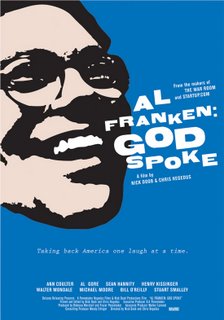 Anthony Kaufman reports on Indiewire.com that one of the funniest scenes in the very funny Al Franken: God Spoke -- the Chris Hegedus-Nick Doob documentary that world-premiered last spring in Austin at the SXSW Film Festival -- will be slightly but significantly shortened before it kicks off a theatrical run Sept. 13 in New York. Specifically: According to Kaufman, the producers trimmed an excerpt from a 2004 debate between liberal gadfly Franken and conservative succubus Ann Coulter at the prestigious Connecticut Forum. Even more specifically: When moderator Steve Roberts "asks the nemeses which historical figure they would [like to] be," Kaufman writes, "Coulter says she'd be Franklin D. Roosevelt so she could prevent the New Deal. Franken says he'd be Hitler so he could prevent a little thing called 'The Holocaust.' Point: Franklin. "
Anthony Kaufman reports on Indiewire.com that one of the funniest scenes in the very funny Al Franken: God Spoke -- the Chris Hegedus-Nick Doob documentary that world-premiered last spring in Austin at the SXSW Film Festival -- will be slightly but significantly shortened before it kicks off a theatrical run Sept. 13 in New York. Specifically: According to Kaufman, the producers trimmed an excerpt from a 2004 debate between liberal gadfly Franken and conservative succubus Ann Coulter at the prestigious Connecticut Forum. Even more specifically: When moderator Steve Roberts "asks the nemeses which historical figure they would [like to] be," Kaufman writes, "Coulter says she'd be Franklin D. Roosevelt so she could prevent the New Deal. Franken says he'd be Hitler so he could prevent a little thing called 'The Holocaust.' Point: Franklin. "So how come the scene now lies on the cutting-room floor? Kaufman surmises that Coulter refused to sign a release that would allow its inclusion in the theatrical-release version of the doc because Franken makes her look so ridiculous during the exchange. And, I must admit, it's easy to buy that scenario, considering that Coulter is... well, as David Letterman warned us, an evil, crazy bitch. But let's get real here, folks: Why would Coulter start worrying about her image at this late date? Isn't she, after all, someone who has based her entire career on the notion that there's no such thing as bad publicity? Under normal circumstances, I would not pass by an opportunity to dis this harpy. But could it be that maybe, just maybe, Steve Roberts is the one who refused to sign a release? (Trust me: He comes off as a major jerk while cavalierly dismissing the late Sen. Paul Wellstone -- an idol of fellow Minnesotan Al Franklin -- as an "unimportant" politico.) Or maybe the Connecticut Forum folks decided they didn't want their paid-admission event being sampled by outsiders.
In any event, whoever caused the scene to be clipped is living in a fool's paradise. Why? Because ever since last march, when Al Franken: God Spoke began its tour through the festival circuit, publicists have sent DVD screeners of the film -- complete with the now-deleted scene -- to critics and journalists all across this great land of ours. (I've watched my copy twice since reviewing the film at SXSW.) Just how long do you think it will be before the excised footage makes its way to YouTube.com? Let's see: If it's Tuesday night now, maybe by Wednesday....?
FOLLOW UP: OK, so maybe Coulter really is the weenie here. All the more reason for someone to leak the missing footage to YouTube.
Filming Iraq
A little more than a year ago, some very ambtious (and exceedingly brave) Iraqis organized the first film festival held in Baghdad since the 2003 US-led invasion that toppled Saddam Hussein (a.k.a., Satan's Bitch). I've yet to hear any word about plans for a second festival in the strife-torn city where, curiously enough, US troops have not yet been showered with rose petals. But judging from this dispatch linked on Movie City News, Iraqi filmmakers are finding other places where they can master their craft and exhibit their art.
Monday, August 28, 2006
When Irish eyes aren't smiling
As the son of a County Sligo, Ireland native, I can understand why Matthew Broderick might want to return to his roots now and then. But... well... gee, how I can put this? Maybe he ought to consider some other vacation spot?
Now showing at a Blockbuster near you
 You always run the risk of damning a movie with faint praise when you start flinging around adjectives like “solid,” “efficient” and – really, I swear to God, I mean this as a compliment – “well-crafted.” But those are precisely the words that spring to my mind as I consider The Sentinel, a crackerjack thriller that opened in megaplexes last spring, and arrives on homevideo this week.
You always run the risk of damning a movie with faint praise when you start flinging around adjectives like “solid,” “efficient” and – really, I swear to God, I mean this as a compliment – “well-crafted.” But those are precisely the words that spring to my mind as I consider The Sentinel, a crackerjack thriller that opened in megaplexes last spring, and arrives on homevideo this week.Michael Douglas brings his trademark clenched intensity to the lead role of Pete Garrison, a veteran Secret Service agent who’s still steamed because he wasn’t able to keep Ronald Reagan out of the line of fire back in 1981. Not surprisingly, he’s obsessed with being the best human shield he can be, so that no Commander in Chief will ever again bite the bullet on his watch. For all his dedication, however, Garrison isn’t exactly a paragon of professionalism – he’s having an affair with the very lovely First Lady (Kim Basinger), which strikes me as, at the very least, a bad career move. Worse, his inappropriate mixing of pleasure with business makes him an easy mark for bad guys who want to frame him as an attention-diverting fall guy during a hunt for would-be Presidential assassins. Bad news: Garrison is perceived as a prime suspect by the equally intense David Breckinridge (Kiefer Sutherland, still radiating his 24 vibe), one of the Secret Service’s top investigators. Worse news: Breckinridge, formerly Garrison’s best buddy, has more than ample reason (or so he believes) to nail our beleaguered hero for something, anything, everything.
I’m going to go way out on a limb here and assume you won’t be surprised to learn that Garrison manages to avoid arrest, so that he can single-handedly set out to clear his name while, oh, I dunno, maybe a thousand or so cops, feds, Secret Service agents and National Guardsmen try to track him down. (OK, I’m exaggerating. A little.) The Sentinel – adapted by scriptwriter George Nolfi from a novel by Gerard Petievich – is a fairly formulaic hunter-becomes-hunted-becomes-hunter-again scenario, complete with high-speed pursuits, hairbreadth escapes and beat-the-clock showdowns. But suspense is sustained with undeniable skill, and the slick proficiency of the entire enterprise is mightily impressive. Credit the game efforts of a splendid cast – Eva Longoria, Martin Donovan and David Rasche figure prominently among the supporting players – and the confident direction of Clark Johnson (S.W.A.T.), an actor-turned-filmmaker who obviously understands that even a by-the-numbers project can add up to something special if you calculate smartly enough.
Sunday, August 27, 2006
Fall preview
From Sunday's New York Daily News: "'Hope springs eternal,' the poet Alexander Pope wrote in 1733. If he were around today, he'd know that hope actually springs in the fall (he'd also have a three-picture deal). And all the signs are here that it's that time of year: It's the beginning of college football season (go UCLA!), the baseball playoffs are ahead (Subway Series, anyone?), and Hollywood is releasing its A-list films. That sound you're hearing is Oscar buzz." Jack Mathews waxes hopeful about the fall movie season, then joins forces with Elizabeth Weitzman to offer a detailed rundown of major titles coming soon to a theater or drive-in near you.
"Invincible' is No. 1
Once again, Nikki Finke scoops everyone with the weekend box-office numbers. Does this intrepid lady ever sleep?
Saturday, August 26, 2006
Cruel, but fair
William H. Macy's advice to filmmakers forced to deal with young actors who do not behave in a professional manner: Fire 'em!
Never too late for a comeback
Just a few days ago, I was wallowing in self-pity while facing the grim prospect of turning 54. Thanks to a head's-up from frequent commenter Moviegal, however, I've been given reason to believe that age is just a number: At 90, Olivia de Havilland may soon be making a bid for her third Oscar.
Friday, August 25, 2006
Outkast blast, it's a gas!
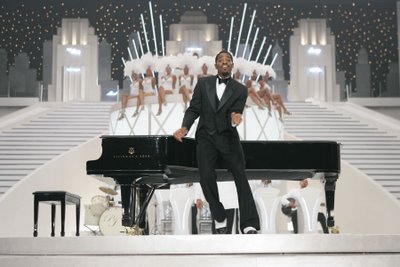 When it comes to Idlewild, there is good news, and then there is great news, because the last big blast of the summer -- or, if you prefer, the first great movie of the fall -- also happens to be one of the very best movies of the year. Andre Benjamin and Antwan A. Patton -- better known as Andre 3000 and Big Boi, and better still known as Outkast -- have joined forces with filmmaker Bryan Barber, the visionary director of Outkast's best videos, to create a visually stunning, emotionally thrilling and kinetically exhilarating musical that nominally is set during the Prohibition Era in small-town Georgia, but substitutes and/or intermingles throbbing hip-hop melodies with the more period-appropriate sounds of jazz, swing, soul and blues. Indeed, the wall-to-wall musical score references just about every post-WWI musical influence imaginable, and the excitingly sensual dance sequences -- often photographed in the "bullet time" style of martial-arts epics and Matrix-style sci-fi thrillers -- suggest a mashed-up amalgam of '20 speakeasies, '40s dancehalls and contemporary dusk-to-dawn raves. Barber isn't afraid to go for over-the-top emotion -- call it hip-hopera, and you won't be far off the mark -- and his boldly free-form storytelling style incorporates everything from CGI visuals to the stutter-stop editing of Jean-Luc Godard. As the Outkast guys might exclaim: "Hey, ya!"
When it comes to Idlewild, there is good news, and then there is great news, because the last big blast of the summer -- or, if you prefer, the first great movie of the fall -- also happens to be one of the very best movies of the year. Andre Benjamin and Antwan A. Patton -- better known as Andre 3000 and Big Boi, and better still known as Outkast -- have joined forces with filmmaker Bryan Barber, the visionary director of Outkast's best videos, to create a visually stunning, emotionally thrilling and kinetically exhilarating musical that nominally is set during the Prohibition Era in small-town Georgia, but substitutes and/or intermingles throbbing hip-hop melodies with the more period-appropriate sounds of jazz, swing, soul and blues. Indeed, the wall-to-wall musical score references just about every post-WWI musical influence imaginable, and the excitingly sensual dance sequences -- often photographed in the "bullet time" style of martial-arts epics and Matrix-style sci-fi thrillers -- suggest a mashed-up amalgam of '20 speakeasies, '40s dancehalls and contemporary dusk-to-dawn raves. Barber isn't afraid to go for over-the-top emotion -- call it hip-hopera, and you won't be far off the mark -- and his boldly free-form storytelling style incorporates everything from CGI visuals to the stutter-stop editing of Jean-Luc Godard. As the Outkast guys might exclaim: "Hey, ya!"
More Moore
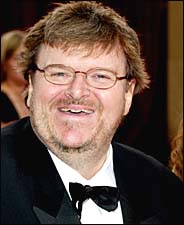 Because of a cash flow problem -- i.e., not enough cash flowing into my wallet -- I won't be able to attend the Toronto Film Festival this year. Bummer. I regret not being able to catch the premieres of several promising films. But I'm especially regretful when I hear that Michael Moore will be previewing segments from not just one but two of his upcoming films. The great thing about Moore is that, whatever you think about his movies, he always manages to piss off people you want to see pissed off.
Because of a cash flow problem -- i.e., not enough cash flowing into my wallet -- I won't be able to attend the Toronto Film Festival this year. Bummer. I regret not being able to catch the premieres of several promising films. But I'm especially regretful when I hear that Michael Moore will be previewing segments from not just one but two of his upcoming films. The great thing about Moore is that, whatever you think about his movies, he always manages to piss off people you want to see pissed off.
Howard hosts
 Following in the footsteps of Angela Bassett, Edie Falco, Don Cheadle and Susan Sarandon, Terence Howard has signed on as host for Independent Lens, the long-running PBS series devoted to documentaries. The new season kicks off Oct. 24 with The World According to Sesame Street, and continues with such notable non-fiction flicks as The Wild Parrots of Telegraph Hill and Enron: The Smartest Guys in the Room. Wonder if they'll update the latter with a new coda that details the trial, conviction and death of the infamous Ken "Kenny Boy" Lay?
Following in the footsteps of Angela Bassett, Edie Falco, Don Cheadle and Susan Sarandon, Terence Howard has signed on as host for Independent Lens, the long-running PBS series devoted to documentaries. The new season kicks off Oct. 24 with The World According to Sesame Street, and continues with such notable non-fiction flicks as The Wild Parrots of Telegraph Hill and Enron: The Smartest Guys in the Room. Wonder if they'll update the latter with a new coda that details the trial, conviction and death of the infamous Ken "Kenny Boy" Lay?
Thursday, August 24, 2006
Coming soon (but not staying long)
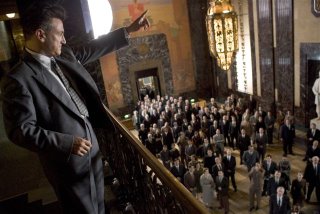 According to the usually reliable ComingSoon.net site, All the King's Men -- Steve Zaillian's remake of the Oscar-winning drama based on Robert Penn Warren's Pulitzer Prize-winning novel -- will be available as a homevideo release on Dec. 19. What makes this just a tiny bit remarkable is the fact that the film -- originally set for release in 2005, when it was hyped as a major Academy Award contender -- will open at theaters and drive-ins everywhere Sept. 22. That's right: A high-profile, major studio release that once seemed like sure-fire Oscar bait, with a cast that includes such notables as Sean Penn (as the Huey Longish politico who's corrupted by power), Jude Law, Anthony Hopkins and James Gandolfini -- this seemingly impressive package will fast-forward to DVD less than three months after its opening weekend. All of which raises the inevitable question: What is wrong with this picture?
According to the usually reliable ComingSoon.net site, All the King's Men -- Steve Zaillian's remake of the Oscar-winning drama based on Robert Penn Warren's Pulitzer Prize-winning novel -- will be available as a homevideo release on Dec. 19. What makes this just a tiny bit remarkable is the fact that the film -- originally set for release in 2005, when it was hyped as a major Academy Award contender -- will open at theaters and drive-ins everywhere Sept. 22. That's right: A high-profile, major studio release that once seemed like sure-fire Oscar bait, with a cast that includes such notables as Sean Penn (as the Huey Longish politico who's corrupted by power), Jude Law, Anthony Hopkins and James Gandolfini -- this seemingly impressive package will fast-forward to DVD less than three months after its opening weekend. All of which raises the inevitable question: What is wrong with this picture?
I grok Rocco rock doc
 My favorite documentary at last spring's Nashville Film Festival -- heck, my favorite movie there, period -- was I Trust You to Kill Me, Manu Boyer's surprpsingly compelling film about the first concert tour by Rocco DeLuca and the Burden in support of their debut CD. Kiefer Sutherland -- who signed the band as the first artists for his Ironworks Music indie label -- goes along for the ride as the group's road manager. But while the actor figures prominently, and confides revealingly, he never upstages DeLuca, a soulfully intense talent who fuses jazz, rock, blues and folk elements while wailing Robert Plant-style vocals to sliding Dobro guitar riffs.
My favorite documentary at last spring's Nashville Film Festival -- heck, my favorite movie there, period -- was I Trust You to Kill Me, Manu Boyer's surprpsingly compelling film about the first concert tour by Rocco DeLuca and the Burden in support of their debut CD. Kiefer Sutherland -- who signed the band as the first artists for his Ironworks Music indie label -- goes along for the ride as the group's road manager. But while the actor figures prominently, and confides revealingly, he never upstages DeLuca, a soulfully intense talent who fuses jazz, rock, blues and folk elements while wailing Robert Plant-style vocals to sliding Dobro guitar riffs.Off-stage, the sad-eyed singer-songwriter comes off as far more reserved, if not downright melancholy, as he candidly discusses his ambivalence about the music industry, and recalls an unhappy childhood spent neglected by distant parents. Without ever pushing too hard, director Boyer pointedly suggests that Sutherland's own mixed feelings about his famous father, Donald Sutherland, may have led him to view DeLuca as something of a kindred spirit. Indeed, Sutherland virtually admits as much during interview sequences shot in moody black-and-white.
Even so, as I noted in my original Variety review, the rockumentary is appreciably livelier when it is more colorful, literally as well as figuratively, while detailing the difficulties faced by any unknown band -- even one backed by a widely recognized film and TV star -- during its first international tour. I Trust You to Kill Me (also the title of the group's first CD) is consistently amusing, and occasionally hilarious, as it follows DeLuca and bandmates Ryan Carman (drums), Dave Beste (bass) and Greg Velasquez (percussion) through a series of demanding gigs in small clubs scattered throughout London, Dublin, Reykjavic and Berlin. A highlight is their performance of "Soul," by far the best cut on their debut release, which nearly blasts the paint off the stage in a Berlin basement club.
At every stop, Sutherland exploits his celebrity as star of the worldwide TV phenom 24, craftily granting timely interviews that will enable him to plug the band. And whenever that proves inadequate, he's not ashamed to simply patrol the streets outside a club and give away tickets to amazed passers-by who can't believe they're seeing who they're seeing.
I thoroughly enjoyed the movie -- and the music. So much so, in fact, that I bought the CD, and paid to see Rocco DeLuca and the Burden perform live here in Houston a few months ago. (That's me in the above photo with the band's rabbit roadie, who also appears in the documentary.) And now it looks like I'll be able to see I Trust You to Kill Me again. The movie will kick off its theatrical run Sept. 8 in New York, followed by bookings in Los Angeles (Sept. 15) and San Francisco (Sept. 29). After that, presumably, it will be opening at theaters and drive-ins everywhere. Until it reaches your neck of the woods, here's a trailer to whet your appetite.
Just how tough is Tony Jaa?
 So tough that, according to Ethan Sacks of the New York Daily News, the cinematographer on Jaa's latest movie, The Protector, had to undergo "a month-long physical training regimen" just to keep up with the Thai action star. Cowabunga.
So tough that, according to Ethan Sacks of the New York Daily News, the cinematographer on Jaa's latest movie, The Protector, had to undergo "a month-long physical training regimen" just to keep up with the Thai action star. Cowabunga.
Wednesday, August 23, 2006
From Perry White to Richard Nixon
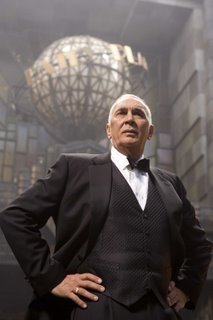 If you're old enough to remember the original telecasts of David Frost's interviews with Richard Nixon in 1977, you're old enough to remember that, during roughly the same period, Frank Langella was the toast of Broadway for his sexy and stylish performance as the sanguine Transylvanian in an acclaimed revival of Dracula. Despite his memorable work in a handful of films during the '70s and early '80s -- including Frank Perry's Diary of a Mad Housewife, Mel Brooks' The Twelve Chairs, Michael Pressman's criminally under-rated Those Lips, Those Eyes and, yes, John Badham's Dracula -- Langella never quite made the transition to full-scale movie stardom. Still, he has remained constantly active on New York and regional stages -- I was fortunate enough to see his Tony Award-winning performance in Edward Albee's Seascape back in 1975, and his splendid portrayal of Henry Higgins in a 1991 Houston Grand Opera production of My Fair Lady -- and he seldom goes too long between attention-grabbing gigs as a character actor in movies and TV. (To see him at his heart-wrenching best, as a TV producer who remains witty and randy even while losing a battle against cancer, check out Bruce Wagner's flawed but fascinating I'm Losing You.) Right now, you can see him on the London stage in Peter Morgan's Nixon/Frost, a drama based on the fateful face-off between the disgraced U.S. president and the career-stalled Brit TV talk-show host. Critics have hailed the play as "a gripping study of the politics of the media," and singled out Langella's portrayal of Nixon as "a masterful study in growling, bear-like charisma, a wily dodger." (Michael Sheen has claimed his own share of kudos as Frost.) Playwright Morgan is about to get a great deal of attention for scripting The Queen, Stephen Frears' upcoming movie about Elizabeth II (Helen Miren). If the much-buzzed-about film is a hit, maybe Morgan will get a chance to bring his new play -- with its original cast -- to the big screen?
If you're old enough to remember the original telecasts of David Frost's interviews with Richard Nixon in 1977, you're old enough to remember that, during roughly the same period, Frank Langella was the toast of Broadway for his sexy and stylish performance as the sanguine Transylvanian in an acclaimed revival of Dracula. Despite his memorable work in a handful of films during the '70s and early '80s -- including Frank Perry's Diary of a Mad Housewife, Mel Brooks' The Twelve Chairs, Michael Pressman's criminally under-rated Those Lips, Those Eyes and, yes, John Badham's Dracula -- Langella never quite made the transition to full-scale movie stardom. Still, he has remained constantly active on New York and regional stages -- I was fortunate enough to see his Tony Award-winning performance in Edward Albee's Seascape back in 1975, and his splendid portrayal of Henry Higgins in a 1991 Houston Grand Opera production of My Fair Lady -- and he seldom goes too long between attention-grabbing gigs as a character actor in movies and TV. (To see him at his heart-wrenching best, as a TV producer who remains witty and randy even while losing a battle against cancer, check out Bruce Wagner's flawed but fascinating I'm Losing You.) Right now, you can see him on the London stage in Peter Morgan's Nixon/Frost, a drama based on the fateful face-off between the disgraced U.S. president and the career-stalled Brit TV talk-show host. Critics have hailed the play as "a gripping study of the politics of the media," and singled out Langella's portrayal of Nixon as "a masterful study in growling, bear-like charisma, a wily dodger." (Michael Sheen has claimed his own share of kudos as Frost.) Playwright Morgan is about to get a great deal of attention for scripting The Queen, Stephen Frears' upcoming movie about Elizabeth II (Helen Miren). If the much-buzzed-about film is a hit, maybe Morgan will get a chance to bring his new play -- with its original cast -- to the big screen?
Monday, August 21, 2006
Wednesday viewing tip
If you find yourself sorely missing The West Wing, well, here comes the Reality TV version: Ivy Meeropol’s The Hill is a slickly produced and irresistibly engrossing docu-series that offers a multilayered look at various forms of politics – local, national and, perhaps most important, office – while focused on the day-to-day activities of U.S. Congressman Robert Wexler and his sometimes co-operative, sometimes contentious staffers. Set to run in six half-hour segments Wednesday through Sept. 27 on the Sundance Channel, it's bound to leave many addicted viewers eager for follow-up episodes.
Wexler, a Democrat (and occasional Stephen Colbert guest) serving his fifth term as representative for Florida’s 19th District, largely comes across as principled but calculating, compassionate yet cautious. (A singular exception: In Episode 2, he boldly breaks with his party’s risk-averse leaders to support a detailed alternative to Republican-supported “Social Security reform.”) Not surprisingly, he prioritizes the interests of his constituents, sometimes – as in Episode 5, when he devotes his full attention to Hurricane Wilma’s assault on Florida – to the exasperation of staffers more concerned about Iraq and Plamegate. But even as Wexler grapples with complexities and compromises, he recedes to the background during long stretches of The Hill as director Meeropol renders the interactions of Wexler’s staffers as the stuff of a Washington, D.C.-based dramedy.
If you want to learn more, take a gander at my Variety review. Or, better still, make a special effort to peruse The Hill.
Wexler, a Democrat (and occasional Stephen Colbert guest) serving his fifth term as representative for Florida’s 19th District, largely comes across as principled but calculating, compassionate yet cautious. (A singular exception: In Episode 2, he boldly breaks with his party’s risk-averse leaders to support a detailed alternative to Republican-supported “Social Security reform.”) Not surprisingly, he prioritizes the interests of his constituents, sometimes – as in Episode 5, when he devotes his full attention to Hurricane Wilma’s assault on Florida – to the exasperation of staffers more concerned about Iraq and Plamegate. But even as Wexler grapples with complexities and compromises, he recedes to the background during long stretches of The Hill as director Meeropol renders the interactions of Wexler’s staffers as the stuff of a Washington, D.C.-based dramedy.
If you want to learn more, take a gander at my Variety review. Or, better still, make a special effort to peruse The Hill.
Do not go gentle into the Old Film Critics Home
I turn 54 tomorrow. And, frankly, I was OK with that -- until I started doing some math. And then it hit me: In less than twenty-four hours, I will be the same age as James Stewart when he starred in The Man Who Shot Liberty Valance. And I will be two years older than John Wayne was when he starred in Rio Bravo. But wait, it gets worse: I’ll be four years older than Walter Brennan was when he co-starred in To Have and Have Not. And eleven years older than Lee Marvin was when he took command of The Dirty Dozen. When I consider how old I used to think those guys looked in those movies….
And then there's this to consider: Warren Oates, my favorite character actor of all time, was just three months short of his 54th birthday when he freakin' died!
Sheesh. Never mind bringing me a drink. Let me have the whole damn bottle, please.
And then there's this to consider: Warren Oates, my favorite character actor of all time, was just three months short of his 54th birthday when he freakin' died!
Sheesh. Never mind bringing me a drink. Let me have the whole damn bottle, please.
"Flag" photographer
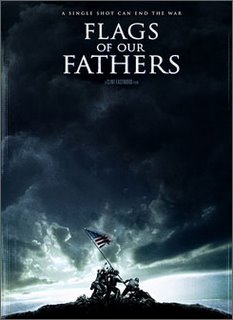 A grim irony: Barely two months before the release of Flags of Our Fathers -- Clint Eastwood's highly-anticipated film about the Battle of Iwo Jima and its aftermath -- photographer Joe Rosenthal, who won a Pulitzer Prize for capturing the iconographic image of six World War II servicemen raising an American flag over battle-scarred Iwo Jima, has died at age 94.
A grim irony: Barely two months before the release of Flags of Our Fathers -- Clint Eastwood's highly-anticipated film about the Battle of Iwo Jima and its aftermath -- photographer Joe Rosenthal, who won a Pulitzer Prize for capturing the iconographic image of six World War II servicemen raising an American flag over battle-scarred Iwo Jima, has died at age 94.
Womanly women
 News flash: Real men like real women with curves. (Thanks for the scoop, Anne Thompson.) Or, as I have said for years: Real hotties have meat on their bones, lines on their faces and brains in their heads. Also: Anyone who makes another nasty remark about Kate Winlset's dress size should be beaten with sticks.
News flash: Real men like real women with curves. (Thanks for the scoop, Anne Thompson.) Or, as I have said for years: Real hotties have meat on their bones, lines on their faces and brains in their heads. Also: Anyone who makes another nasty remark about Kate Winlset's dress size should be beaten with sticks.
Sunday, August 20, 2006
Not so great "Snakes"
From The Hollywood Reporter: "It might be that the R-rated [Snakes on a Plane] suffers from the same problem as the 1990 Buena Vista film Arachnophobia, which underperformed at the boxoffice because no one wanted to see a film about spiders. Snakes might sound great on paper, but in the theater they could be a bit too scary for even the most hardened horror fan."
Gee, maybe this also explains why Eight-Legged Freaks emptied out theaters quicker than someone yelling "Fire!"
Gee, maybe this also explains why Eight-Legged Freaks emptied out theaters quicker than someone yelling "Fire!"
Saturday, August 19, 2006
Typecasting
 My son wanted to know what I thought of his new, way-cool sunglasses. But I really didn't want to tell him: I think they make him look like the underling of a B-movie crimelord. I mean, jeepers, can't you imagine someone looking like this getting the crap kicked out of him by Jean-Claude Van Damme, Steven Seagal or even Shannon Tweed?
My son wanted to know what I thought of his new, way-cool sunglasses. But I really didn't want to tell him: I think they make him look like the underling of a B-movie crimelord. I mean, jeepers, can't you imagine someone looking like this getting the crap kicked out of him by Jean-Claude Van Damme, Steven Seagal or even Shannon Tweed?
Speaking of music videos....
After seeing this, Keith Olbermann suggested a grudge match between the singer and another bear. Only this time, the bear would be armed. Or the singer wouldn't. Either way sounds fair to me.
Countdown to "Idlewild"
You know, I'm a little nervous about getting so pumped up for a movie based almost entirely on a hot trailer and a cool music video. But the advance screening in my market just happens to be scheduled for Aug. 22 -- my birthday. I can't help thinking that is a good sign.
Saturday night viewing tip
Metallica: Some Kind of Monster (8 p.m. Central on VH1 Classic) is a mesmerizing documentary that’s all the more amazing for being more or less an accident. Directors Joe Berlinger and Bruce Sinofsky (Brother's Keeper, Paradise Lost: The Child Murders at Robin Hood Hills) were hired to make a promotional film about Metallica as the heavy-metal band worked on their 2003 "St. Anger" CD. But while the filmmakers were tightly focused on the often contentious musicians, they were able to witness and record two years of emotional upheavals, internecine conflicts and on-again, off-again group therapy sessions. Fascinating stuff, even if your musical tastes run more toward bluegrass or grand opera.
Friday, August 18, 2006
Lee Marvin: Still The Man
 Before the intense Sonny Crockett zipped through a pastel-colored Miami to a techno-rock beat, there was Lee Marvin, in living black and white, as Lt. Frank Ballinger, a savagely single-minded Chicago cop who blasted away killers to the tune of percussive jazz in M Squad (1957-60).
Before the intense Sonny Crockett zipped through a pastel-colored Miami to a techno-rock beat, there was Lee Marvin, in living black and white, as Lt. Frank Ballinger, a savagely single-minded Chicago cop who blasted away killers to the tune of percussive jazz in M Squad (1957-60).Before bad-ass rappers and black-hatted country boys began to strut their stuff in image-enhancing music videos, there was Lee Marvin, in Richard Brooks' aptly titled The Professionals (1966), playing Henry Fardan, a steely-eyed tactician who's so glacially cool that, throughout most of a long ride across the blazing Mexican desert, he keeps his shirt buttoned up to the neck.
And before Arnold Schwarzenegger cut a relentless path of destruction through Los Angeles in The Terminator, there was Lee Marvin, offering the definitive portrait of an obsessed man of violence who will let nothing -- not even, apparently, his own mortality -- impede his implacable force of vengeful will in John Boorman's classic Point Blank (1967).
Mortality finally caught up with Lee Marvin 19 years ago this month when he died at age 63. But he remains immortal on film and videocassette -- and in cable-TV retrospectives like the Sunday marathon on Turner Classic Movies -- where he can be seen time and again as a ferocious force of nature barely contained, ever ready to erupt. Lean and leathery, he was an actor who could threaten with a beaming smile, who could deliver a death sentence with a casual shrug.
In The Killers (1964), he gave one of his greatest performances as Charlie Strom, a soft-spoken hit man who brutally interrogates a sultry femme fatale (Angie Dickinson) with the insinuating murmur of a considerate lover. Late in the film, after Marvin realizes he's been betrayed by Dickinson and (no kidding) Ronald Reagan, he holds the treacherous pair at gunpoint. Dickinson frantically begins to explain why Marvin was set up, why she helped another hit man lie in wait for him. But Marvin, fatally wounded, cuts her short. With the weary impatience of someone who has lived too long and killed too often, he shakes his head slightly and says: ''Lady, I just haven't got the time.''
Blam! Blam! End of conversation.
Marvin began his film career as a kind of general-purpose psychopath, embodying an evil so mindless and malevolent that his defeat or demise would guarantee audience cheers. M Squad, one of the most violent shows in the history of TV, nudged him slightly toward more heroic roles -- though, truth to tell, it was difficult to see much difference between his mayhem as a movie villain and his crimefighting as a prime-time cop. But it was not until his Oscar-winning comic turn in Cat Ballou (1965) that Marvin was embraced as a leading man by moviegoers. Or, to be more precise, he was warily accepted, much the same way you might accept as a house pet a mountain lion that supposedly has been domesticated.
He was lots of fun as a drunken gunfighter (and the drunk's deadlier brother) in Cat Ballou, particularly when he stumbled into the funeral for the very man he was hired to protect. (Seeing a row of lit candles, he smiled a goofy grin and proceeded to sing: ''Happy birthday to you . . .'') But then the time came for the comical drunk to sober up and strap on his six guns. When he did, nobody was laughing.
After he became a star, alas, Marvin occasionally was guilty of lazy, obviously alcohol-influenced performances. In such turkeys as The Klansman (1975), with Richard Burton (and, no kidding, O.J. Simpson), and Avalanche Express (1979), with Robert Shaw, he behaved on screen very much like someone who felt rudely interrupted from a more important off-screen task (i.e., drinking his co-stars under a table). In later years, however, Marvin seemed to snap out of his self-indulgent slump, with performances ranging from the no-frills professionalism of his Royal Canadian Mountie in Death Hunt (1981) to the elegant bravado of his vaguely sinister businessman in Gorky Park (1983). In Death Hunt, Marvin has a great moment where he tries to talk fugitive Charles Bronson into surrendering -- while Bronson holds a shotgun just inches away from Marvin's starkly chiseled face. Marvin, not surprisingly, manages to maintain his cool during the tense situation.
But if he's cool in Death Hunt, he's practically sub-zero in Gorky Park, suave and self-assured in the face of what he views as the clumsy investigative efforts of a Moscow police detective (William Hurt). After completing the movie, Marvin complained to an interviewer (well, OK, he bitched to me) about a scene where Hurt keeps raising his voice during their conversation about a murder case. Marvin thought Hurt was trying to upstage him. But even if he was, the scene works even better that way: There's Hurt, struggling to come on macho and masterful even as he knows he's on thin ice; and there's Marvin, who's too contemptuously smug to feel the need to raise his voice.
Marvin's authoritative underplaying served him well in a variety of heroic parts -- especially as the commanding officers in The Dirty Dozen (1967), Robert Aldrich's revisionist yet rousing World War II adventure, and The Big Red One (1979), Samuel Fuller's autobiographical drama of wartime service in Europe. (Marvin, an ex-Marine, could be quite persuasive as a military man.) At his frequent best, he could convey a moral dimension without seeming preachy, and an impatience with stupidity without being short-tempered. In The Professionals, Ralph Bellamy -- who hires Marvin, Burt Lancaster, Robert Ryan and Woody Stride for a dangerous rescue mission -- asks if Marvin has "any objections to working with a Negro'' (Strode). Marvin waits a few seconds before speaking, but his expression is easy to read: ''What the hell kind of damn fool question is that?'' When Marvin finally does speak, he pointedly ignores Bellamy's query -- there are more important matters to discuss.
Yes indeed, Lee Marvin could be tough. (In Point Blank, he made movie history of sorts by being the first star to -- ouch! -- slug another man in the groin.) Yet he could also be affectingly poignant as the broken-down baseball player in Ship of Fools (1965). And he was nothing less than brilliant as Hickey, Eugene O'Neill's haunted and haunting traveling salesman, in John Frankenheimer's under-rated film version of The Iceman Cometh (1973). At the very end of Iceman, Hickey must drop the veneer of loquacious charisma, must end his self-deluding efforts to dispel the pipedreams of his cronies, to unleash a volcanic rage that horrifies even Hickey himself. Marvin roars the words -- ''You know what you can do with your pipedreams now, you damned bitch!" -- then recoils in pain, despair, self-disgust. For once, the self-possessed control freak has let down his guard, and the demons have been set loose. And it suits O'Neill's drama perfectly. Or, as critic Stanley Kauffmann put it: ''Marvin was born to play Hickey.''
Maybe. Or maybe, more likely, Lee Marvin was born to just give everyone, himself included, a damn good time at the movies. ''I would like to entertain an audience,'' he told me during a 1981 interview. ''I've done the heavy films, the truthful ones. And once in a while, they get too depressing for an audience.''
(An ironic sidebar: During our conversation, I kidded him about "shooting President Reagan" back in 1964's The Killing. "Yeah," responded with a wolfish grin, "but he wasn't President yet when I shot him." The very next day, John Hinckley tried to gatecrash into history by taking aim at the Commander in Chief.)
For all his independence, on screen and off, Marvin confessed to a nostalgia for the old, autocratic days of Hollywood, when only moguls in charge of studios were to be taken seriously.
''It took a lot of thinking away from you,'' Marvin said. ''You didn't have to twist and turn at night, wondering what line you were going to say the next day. Because they'd already written it. You just came to work, kept your mouth shut, got your job done and went home -- with a check.''
There was a comforting simplicity in all that, Marvin said. The sort of simplicity a true professional could appreciate.
"Snakes on a Blog," Part 2
 From the same folks who last year gave us H.G. Wells' War of the Worlds -- the C. Thomas Howell vidpic, not the Steven Spielberg blockbuster -- we now get Snakes on a Train, another low-budget, high-concept quickie aimed at riding the coattails of a bigger and pricier pic. (I don't have to tell you what movie they're ripping off this time, do I?) Unfortunately, neither undiscriminating action fans nor connoisseurs of high camp will find much bite in this latest direct-to-video product from The Asylum, an outfit that specializes in cheap knock-offs of more upscale megaplex fare. (The Da Vinci Treasure and Pirates of Treasure Island are other recent additions to the company's catalogue.) Maybe SOAT was intended as a tongue-in-cheeky goof. But as Huey Lewis and the News sagely noted: Sometimes, bad is just bad.
From the same folks who last year gave us H.G. Wells' War of the Worlds -- the C. Thomas Howell vidpic, not the Steven Spielberg blockbuster -- we now get Snakes on a Train, another low-budget, high-concept quickie aimed at riding the coattails of a bigger and pricier pic. (I don't have to tell you what movie they're ripping off this time, do I?) Unfortunately, neither undiscriminating action fans nor connoisseurs of high camp will find much bite in this latest direct-to-video product from The Asylum, an outfit that specializes in cheap knock-offs of more upscale megaplex fare. (The Da Vinci Treasure and Pirates of Treasure Island are other recent additions to the company's catalogue.) Maybe SOAT was intended as a tongue-in-cheeky goof. But as Huey Lewis and the News sagely noted: Sometimes, bad is just bad.Working from a brazenly absurd yet tediously unamusing script by Eric Forsberg, fraternal auteurs identified only as The Mallachi Brothers offer an unappetizing smorgasbord of stiff performances, klutzy continuity, transparently fake gore and slapdash special effects. Worse, the vidpic is so numbingly dull throughout its first two-thirds that most viewers won’t even bother to hit the pause button during refrigerator raids or bathroom breaks.
The plot involves an unfortunate Mexican beauty (Ryanne Ruiz) who’s been smacked with a Mayan curse that causes her to chronically upchuck snakes. Her attentive husband (Alby Castro) smuggles her across the border into Texas, where they stowaway aboard a train bound for Los Angeles (where, apparently, it’s much easier to find a top-notch Mayan curse dispeller). During the journey, however, the regurgitated snakes just keep getting bigger and bigger, hungrier and hungrier, much to the increasing discomfort of the other passengers. Nothing good comes of this.
In the event you want to know more, my Variety review is available here. As for myself, I can't help wondering whether the Minutemen might try to use SOAT for fundraiser screenings. I mean, gee whiz, what better tool could they use to demonstrate the dangers of an unprotected U.S.-Mexico border?
George Bush in "The Lost Weekend"
Fearless prediction: This will be the most frequently downloaded video since Paris Hilton became a virgin again.
"Snakes" on a blog
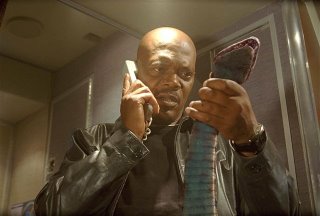 And so, after six months of fanboy-fueled, Internet-inflamed hype, we finally get… well, a pretty damn good rock-the-house, go-for-broke action flick. No kidding: Snakes on a Plane has the style and swagger of a down-to-earth, meat-and-potatoes B-movie of 30 years ago. (Indeed, it’s easy for me to imagine watching it on a double bill with John Singleton’s similarly retro Four Brothers at the Skyview Drive-In in New Orleans around 1974 or thereabouts.) But its easy-to-encapsulate high-concept plot (dead solid perfect for a TV Guide blurb) and unpretentious fealty to genre conventions remind me more of those 90-minute Movies of the Week that ABC churned out relentlessly during the same decade. Of course, I don’t recall any of those TV-movies featuring a scene similar to the one in SOAP where a randy couple is rudely interrupted by a venomous viper while they earn their membership in the Mile High Club. (Nor do I remember anyone in a ’70s telefilm losing his one-eyed trouser snake to a famished reptile, as happens to a hapless bit player here.) And while TV-movie vets Darren McGavin and Robert Culp often impressed as hard-ass heroes back in the day, neither of them ever got to rant and rave about “these motherfuckin’ snakes on this motherfuckin’ plane!”
And so, after six months of fanboy-fueled, Internet-inflamed hype, we finally get… well, a pretty damn good rock-the-house, go-for-broke action flick. No kidding: Snakes on a Plane has the style and swagger of a down-to-earth, meat-and-potatoes B-movie of 30 years ago. (Indeed, it’s easy for me to imagine watching it on a double bill with John Singleton’s similarly retro Four Brothers at the Skyview Drive-In in New Orleans around 1974 or thereabouts.) But its easy-to-encapsulate high-concept plot (dead solid perfect for a TV Guide blurb) and unpretentious fealty to genre conventions remind me more of those 90-minute Movies of the Week that ABC churned out relentlessly during the same decade. Of course, I don’t recall any of those TV-movies featuring a scene similar to the one in SOAP where a randy couple is rudely interrupted by a venomous viper while they earn their membership in the Mile High Club. (Nor do I remember anyone in a ’70s telefilm losing his one-eyed trouser snake to a famished reptile, as happens to a hapless bit player here.) And while TV-movie vets Darren McGavin and Robert Culp often impressed as hard-ass heroes back in the day, neither of them ever got to rant and rave about “these motherfuckin’ snakes on this motherfuckin’ plane!”Samuel L. Jackson gets to do those honors in SOAP. And judging from the way his outburst is less-than-seamlessly edited into the action, it’s easy to believe the rumors that this scene – along with the above-mentioned naughty bits, and many of the more graphically violent snake attacks – were after-the-fact additions aimed at upping the ante from PG-13 to R. But so what? The rough edges -- much like the predictable plotting, the shameless stereotypes and the deliberately cheesy special effects – are part of the down-and-dirty, blast-from-the-past fun.
Jackson blowtorches his way through the film with his trademark aplomb as Special Agent Flynn, an FBI operative charged with protecting a murder witness (Nathan Phillips) from the paid assassins of a sadistic crimelord during a Honolulu-to-Los Angeles redeye flight. Unfortunately, the crimelord has his minions slip into the baggage hold and plant – well, shoot, go back and look at the title, OK? Besides, you don’t need no stinkin’ plot synopsis: Writers John Heffernan and David Loucka haven’t written a script, they’ve merely provided bulletpoints, enabling director David Ellis to methodically tick items off a list of clichés. The flight crew includes a stewardess (Julianna Margulies) who’s taking her “last flight” before early retirement? Check. A mother with a tiny baby is threatened (but, of course, not killed) by a snake? Ditto. Two small children are endangered by a humongous cobra? Got it. An untrained civilian must take control of the cockpit when the pilots are incapacitated? Done.
Rather than try to transcend his pulpy material, or gussy it up with flash and filigree, Ellis prefers to do it Old School style: He puts the pedal to the metal and keeps his movie moving faster than the speed of thought. Is Snakes on a Plane laughable? Quite often. (To indicate a snake’s p.o.v., the director employs what David Letterman might call a Reptile-Cam approach: He wraps the lens in what appears to be greenish cellophane.) Is it entertaining? More than enough to qualify as a guilty pleasure that greatly amuses by living down to its hype.
Thursday, August 17, 2006
Roger Ebert: Progress Report
"Insiders" indicate his full recovery may be months away. To put it succinctly: This blows. Looks like I have to go back to church and pay for a few more candles to light. Dammit, Roger -- this is getting expensive!
Tuesday, August 15, 2006
R.I.P. Bruno Kirby (1949-2006)
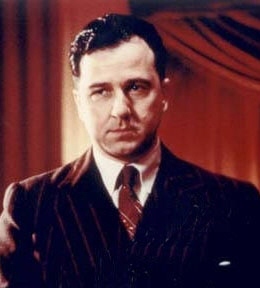 Bruno Kirby will long be remembered for his perfect-pitch comic turns in movies ranging from Good Morning, Vietnam (in which he played Robin Williams’ hopelessly unfunny rival DJ) to City Slickers (where he hilariously exploded while Billy Crystal explained to Daniel Stern for the zillionth time how to program a VCR). But my favorite Kirby performance, I must admit, is one of his more obscure credits, a 1993 episode of the noirish Showtime cable series Fallen Angels. In “I’ll Be Waiting,” adapted by scripter C. Gaby Mitchell from a short story by Raymond Chandler, he was shrewdly cast against type (by director Tom Hanks) as a seemingly stolid hotel detective who is underestimated by just about everybody – even the femme fatale who enlists his aid – until, during the genuinely shocking climax, he calmly takes out a gun and neutralizes a deadly threat. “When I was casting this role,” Hanks told me years later, “I wanted someone who looked like he was a shoe salesman – but who could break your thumbs if he had to.” If other directors had been as audacious as Hanks, Kirby might have had a very different career. Even so, he made an indelible impression as a protean character actor – When Harry Met Sally, The Freshman and Donnie Brasco also loom large on his resume – and he will be sorely missed. Fortunately, he is on film, so he will be immortal.
Bruno Kirby will long be remembered for his perfect-pitch comic turns in movies ranging from Good Morning, Vietnam (in which he played Robin Williams’ hopelessly unfunny rival DJ) to City Slickers (where he hilariously exploded while Billy Crystal explained to Daniel Stern for the zillionth time how to program a VCR). But my favorite Kirby performance, I must admit, is one of his more obscure credits, a 1993 episode of the noirish Showtime cable series Fallen Angels. In “I’ll Be Waiting,” adapted by scripter C. Gaby Mitchell from a short story by Raymond Chandler, he was shrewdly cast against type (by director Tom Hanks) as a seemingly stolid hotel detective who is underestimated by just about everybody – even the femme fatale who enlists his aid – until, during the genuinely shocking climax, he calmly takes out a gun and neutralizes a deadly threat. “When I was casting this role,” Hanks told me years later, “I wanted someone who looked like he was a shoe salesman – but who could break your thumbs if he had to.” If other directors had been as audacious as Hanks, Kirby might have had a very different career. Even so, he made an indelible impression as a protean character actor – When Harry Met Sally, The Freshman and Donnie Brasco also loom large on his resume – and he will be sorely missed. Fortunately, he is on film, so he will be immortal.
Twenty-two years after 1984...
Sometimes real life can be scarier than anything a scriptwriter would dare to invent. Consider the scenario proposed by Keith Olbermann.
Monday, August 14, 2006
Happy Birthday, Alfred Hitchcock!
The best way to celebrate Alfred Hitchcock's birthday -- well, OK, the best way other than actually watching one of his movies -- is to take Anne Thompson's Hitchcock quiz. Don't worry, it's not too challenging. In fact, it's more of a survey than an actual test: You can tell the world what Hitch flick is your fave, which is his most romantic -- and which one has caused the most sleepless nights for you. Plus, you get to answer the burning question that every Hitchcockian must ultimately address: Gary Grant or James Stewart?
Sunday, August 13, 2006
Surviving and thriving
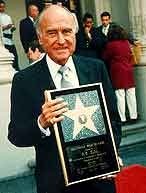 Maybe you’re not familiar with the name A.C. Lyles. But if you’re of a certain age – or, more important, if you’re fond of a certain film genre – you likely have seen many of his movies. Throughout the 1960s, he produced a series of frankly formulaic but reliably entertaining low-budget Westerns for Paramount, casting such sturdy veterans as Dana Andrews, Barry Sullivan, Howard Keel, Lon Chaney Jr., John Ireland, Rory Calhoun, John Agar and Broderick Crawford in two-fisted shoot-’em-ups with titles like Town Tamer (1965), Apache Uprising (1966), Red Tomahawk (1967) and Arizona Bushwackers (1968). (Many of them played to raptly attentive audiences at the Nola Theatre in my old New Orleans neighborhood.) And in 1972, he unleashed that guiltiest of guilty pleasures: Night of the Lepus, the jaw-dropping, mind-blowing camp classic that gave us giant killer bunny rabbits decades before Donnie Darko was a midnight-movie circuit staple.
Maybe you’re not familiar with the name A.C. Lyles. But if you’re of a certain age – or, more important, if you’re fond of a certain film genre – you likely have seen many of his movies. Throughout the 1960s, he produced a series of frankly formulaic but reliably entertaining low-budget Westerns for Paramount, casting such sturdy veterans as Dana Andrews, Barry Sullivan, Howard Keel, Lon Chaney Jr., John Ireland, Rory Calhoun, John Agar and Broderick Crawford in two-fisted shoot-’em-ups with titles like Town Tamer (1965), Apache Uprising (1966), Red Tomahawk (1967) and Arizona Bushwackers (1968). (Many of them played to raptly attentive audiences at the Nola Theatre in my old New Orleans neighborhood.) And in 1972, he unleashed that guiltiest of guilty pleasures: Night of the Lepus, the jaw-dropping, mind-blowing camp classic that gave us giant killer bunny rabbits decades before Donnie Darko was a midnight-movie circuit staple.Now I know what you’re thinking: An intro such as that usually is prelude to a respectful obituary. But take heart: A.C. Lyles is alive and well and, no kidding, serving as technical adviser for producer David Milcher’s HBO series Deadwood. But wait, there’s more: After toiling for seven decades at Paramount, the eternally youthful Lyles currently is preparing an oral history of the studio. You can read all about it in Anne Thompson’s fascinating Risky Business column this week. And in the off-chance that Mr. Lyles himself might be reading this: I can think of at least one middle-aged blogger who’d gladly accept a gig as research assistant and/or wordsmith-for-hire on your project.
Brisk "Trade"
As usual, the lovely and talented Nikki Finke is first with the weekend box-office report. No big surprises -- well, except maybe for the major haul claimed by Step Up -- but some good news for the makers of World Trade Center.
Saturday, August 12, 2006
Dance fever
 Although I’m at least a decade or two (or three or four) beyond the target demographic for Step Up – a teen-skewing hip-hop urban fantasy about attractive opposites who become complementary dance partners – I was pleasantly surprised by the movie’s wall-to-wall charm and highly contagious exuberance. (And lest any of you accuse me of being too taken by the barely-legal allure of lead player Jenna Dewan, let me hasten to note that I was too busy gazing at co-star Rachel Griffiths – who plays Ms. Dewan’s school principal, OK?-- to be hormonally inflamed by a mere child.) But I must admit: Even I never expected it to be the top-grossing film in North America on opening day (Aug. 11). True enough, I almost posted the following prediction on David Poland’s Hot Blog: “Don’t be surprised if Step Up is more popular with ticketbuyers than tracking surveys indicate.” But you know what? I wimped out, and didn’t make the post. The moral? No guts, no glory.
Although I’m at least a decade or two (or three or four) beyond the target demographic for Step Up – a teen-skewing hip-hop urban fantasy about attractive opposites who become complementary dance partners – I was pleasantly surprised by the movie’s wall-to-wall charm and highly contagious exuberance. (And lest any of you accuse me of being too taken by the barely-legal allure of lead player Jenna Dewan, let me hasten to note that I was too busy gazing at co-star Rachel Griffiths – who plays Ms. Dewan’s school principal, OK?-- to be hormonally inflamed by a mere child.) But I must admit: Even I never expected it to be the top-grossing film in North America on opening day (Aug. 11). True enough, I almost posted the following prediction on David Poland’s Hot Blog: “Don’t be surprised if Step Up is more popular with ticketbuyers than tracking surveys indicate.” But you know what? I wimped out, and didn’t make the post. The moral? No guts, no glory.
Hitch
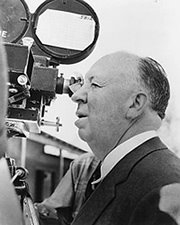 More than 26 years after his death, Alfred Hitchcock continues to entertain us, and occasionally astonish us. But that doesn’t mean he ever really liked us. Indeed, there is ample evidence to the contrary – which, all things considered, might not be such a bad thing. Francois Truffaut, who famously interviewed and occasionally emulated the Master of Suspense, once spoke of his idol as “the man whom we are glad to be despised by.” And, mind you, Truffaut meant that as a compliment.
More than 26 years after his death, Alfred Hitchcock continues to entertain us, and occasionally astonish us. But that doesn’t mean he ever really liked us. Indeed, there is ample evidence to the contrary – which, all things considered, might not be such a bad thing. Francois Truffaut, who famously interviewed and occasionally emulated the Master of Suspense, once spoke of his idol as “the man whom we are glad to be despised by.” And, mind you, Truffaut meant that as a compliment.It’s important to remember that, throughout his life, Hitchcock never tired of manipulating our ambivalent responses to violent death. In doing so, he shamelessly pandered to our baser instincts, implicating us in the machinations of his characters by exploiting our voyeuristic impulses. Thanks to him, we really want James Stewart to be right when thinks he witnessed a murder in Rear Window (1954). We really want Farley Granger’s slatternly estranged wife to get what’s coming to her in Strangers on a Train (1951). And we really, really want Anthony Perkins to dispose of that car with the bloody corpse inside the trunk in the swamp behind the Bates Motel in Psycho (1960).
As early as Blackmail (1929), his first talking picture, Hitchcock was indulging in devious sleight-of-hand to make moviegoers share the guilty pleasure – and the not-so-pleasurable guilt – of being, in essence, accomplices to crime. A reckless young woman abandons her policeman boyfriend for a night on the town with a seductive artist. The artist lures her into his apartment – truth to tell, he doesn’t have to do much to convince her – and tries to rape her. She responds by stabbing him to death, then taking flight. The next morning, however, she’s so conscience-stricken that, at the breakfast table, she jumps at each mention of cutlery. Hitchcock intensifies the tension by playing tricks with the soundtrack, so that we, like the young woman, recognize only one word -- knife – amid an otherwise barely audible murmur.
A few years later, in Sabotage (1936), Hitchcock mercilessly sustained a sequence of almost unbearable suspense by following a little boy aboard a bus as he unwittingly transports a package containing a bomb. Just when we’re almost ready to assume that, hey, Hitch really had us going there for a few minutes – ka-boom! The bomb explodes, the boy is killed – and his older sister (Sylvia Sidney) is sufficiently motivated to stick a large knife into the saboteur (Oscar Homolka) who just happens to be her husband.
But rest assured: She doesn’t do it nearly fast enough to satiate the audience’s bloodlust.
Do we blame Hitchcock for bringing out the worst in us? Quite the contrary: We’re greatly amused, and grateful, for being so effectively worked over. And yet, when you remember the haughtily droll host who quipped his way through countless interviews, promotional shorts and wrap-around segments for his long-running TV series, you may find yourself reading something like contempt in his insolent smirk. Something like the regard of a seasoned prostitute for her most eager customers.
Still, diehard Hitchcockians (and I count myself among that number) will want to set aside several hours this weekend to watch the Encore Mystery cable network during its ongoing marathon of Hitchcock classics, timed to celebrate the master’s Aug. 13, 1899 birth date. The lineup runs the gamut from his early British career (The Lady Vanishes) to his final Hollywood production (the criminally under-rated Family Plot), and includes masterworks as Psycho, Vertigo, Rebecca, Shadow of a Doubt — and, best of all, my all-time Hitchcock fave, Notorious. Enjoy.
Thursday, August 10, 2006
Do go "Knocking"
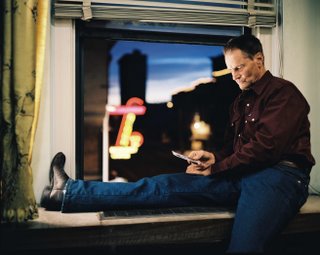 I hate to sound like one of those semi-pathetic folks who are always waxing nostalgic about their (alleged) glory days. Every so often, though, I get depressed when I see a really terrific movie getting little notice. Whenever this happens, it reminds me of how I used to be able to call attention to certain movies – and, yes, influence people to actually go see them – during my 13-year tenure at the Houston Post (and, for four years after that, at NBC affiliate KPRC-TV). My only hope is, maybe -- just maybe – I can do something similar on the Internet.
I hate to sound like one of those semi-pathetic folks who are always waxing nostalgic about their (alleged) glory days. Every so often, though, I get depressed when I see a really terrific movie getting little notice. Whenever this happens, it reminds me of how I used to be able to call attention to certain movies – and, yes, influence people to actually go see them – during my 13-year tenure at the Houston Post (and, for four years after that, at NBC affiliate KPRC-TV). My only hope is, maybe -- just maybe – I can do something similar on the Internet.The immediate reason for these musings: Last spring, I saw Wim Wenders’ Don't Come Knocking at the Greenway 3 in my home base of Houston. After the first five or so minutes, I turned to my companion and whispered: “We’re in good hands.” She nodded in agreement. And you know what? The movie only got better after that. Sam Shepard (who also wrote the script) is excellent in the lead role of Howard Spence, an aging Western movie star who goes AWOL from his latest comeback vehicle. Driven by discontent (and, possibly, a vague desire to rediscover himself), he visits his long-estranged mother (Eva Marie Saint, who’s even more wonderful here than she was in Superman Returns) in Elko, Nevada. She surprises him with news of a child he fathered years earlier during a location shoot in Butte, Montana. So heads back to “the scene of the crime,” to seek reconciliation with a former lover (Jessica Lange, Shepard's off-screen longtime companion) and the adult son (Gabriel Mann) he has never known.
I know: Sounds corny and predictable. But it isn’t. The movie is by turns funny and affecting, wistful and wrenching, my favorite so far in 2006. The actors -- including Tim Roth, Fairuza Balk and the radiant Sarah Polley – are excellent. (Look for Oscar-winner George Kennedy in a wink-wink, nudge-nudge cameo as a beleaguered film director.) And the cinematography by Franz Lusting is nothing short of extraordinary: The gaudy casinos of Elko and the dreary cityscapes of Butte look almost magical.
Unfortunately, Don’t Come Knocking -- Shepard's second collaboration with Wenders, after the extraordinary Paris, Texas (1984) -- flopped resoundingly during its fleeting theatrical release. So badly, in fact, that it really came as no surprise when Wenders – who hasn’t made such an accessible film since the classic Wings of Desire (1987) – recently announced that he was leaving the United States and moving back to his native Germany. But now Don’t Come Knocking has a second chance to reach receptive audiences, thanks to the modern miracle of DVD. To paraphrase Larry McMurtry – don’t let this horseman pass you by.
Friday, August 04, 2006
Bloggus Interruptus
Pressing family matters likely will keep me away from the computer for the next few days. My apologies. On the other hand, I'm not the least bit ashamed to admit that I kinda-sorta liked Barnyard.
Wednesday, August 02, 2006
Anyone up for a "Doberman Gang" remake?
Breaking news: Frenzied canine takes revenge on The King, claiming "You Ain't Nothin' But a Hound Dog" were "fighting words."
Michael Leydon (1923-2006) -- R.I.P.
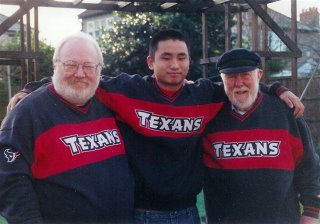 After a long battle with lung cancer – a battle I assumed he would win because, gosh, I always assumed he was tougher than Death – my father (third from left, after me and my son) died yesterday. And I have to tell you folks: It’s all his fault. Yes, he bought me a second-hand typewriter when I was at an impressionable age – not quite yet in high school -- and he encouraged me to write. Little did he realize that, because I was a faithful reader of Castle of Frankenstein magazine at the time, I would want to write mini-reviews of horror films (just like those in the magazine). That, alas, was enough to get me addicted to writing about movies, and I’ve been at it ever since.
After a long battle with lung cancer – a battle I assumed he would win because, gosh, I always assumed he was tougher than Death – my father (third from left, after me and my son) died yesterday. And I have to tell you folks: It’s all his fault. Yes, he bought me a second-hand typewriter when I was at an impressionable age – not quite yet in high school -- and he encouraged me to write. Little did he realize that, because I was a faithful reader of Castle of Frankenstein magazine at the time, I would want to write mini-reviews of horror films (just like those in the magazine). That, alas, was enough to get me addicted to writing about movies, and I’ve been at it ever since.My father was born in County Sligo, Ireland. When he was very young, his father felt compelled to leave his family and move to the United States, lest he run afoul of authorities because of his support for the IRA (an organization my father supported a great deal more than he probably should have). When the family farm went bust, my father decided – at age 16 – to start working aboard merchant ships. He served in the British Merchant Marine during WWII, and was aboard a convoy ship carrying troops and supplies on D-Day – a fact he never shared with me until long after the release of Saving Private Ryan. Oddly enough, he was much more willing to talk about why he wound up serving in the Korean War after moving to the United States: He got drunk one night, wrapped a car (not his own) around a tree, and was told by a judge that he would serve hard time unless he immediately enlisted. (While in the Army, he often told me, he witnessed the early integration of the Armed Services – and smoked an inordinate amount of marijuana.)
My father was a merchant seaman – and a proud member of the National Maritime Union – for more than 30 years. He remained an unrepentant Old School Leftie throughout his entire life – during the Vietnam War, he offered to buy me a plane ticket to Canada if I were drafted – and he always took great delight in knowing that his eldest child somehow managed to sustain the scam of getting paid to go to the movies. As for his own cinematic preferences: He thought David Lean’s Dr. Zhivago was the greatest movie ever made. After he fell in love with my stepmother-to-be, and she moved back to Liverpool during the latter 1960s because she found it impossible to endure the sultry summers of my native New Orleans, he spent an inordinate amount of time moping around the house while listening to the ultra-schmaltzy “Laura’s Theme” on the Dr. Zhivago soundtrack. Thank God they got back together; he ultimately opted to live, and eventually die, in Liverpool. Even Maurice Jarre, composer of the Oscar-winning Zhivago score, sympathized with me when I told him years later how much his music had begun to grate on me during my dad’s deep blue funk.
My father also once told me that he really, really enjoyed William Wyler’s The Collector (1965) “because the guy got away with it in the end.” (I’m not sure I want to know why this pleased him so much, but I must agree: Terence Stamp and Samantha Eggar have never been better.) And I think he was never prouder of me than when I was able to take him to a supper club performance of his favorite comic, Red Skelton, which I reviewed at The Blue Room in New Orleans.
But my fondest movie memory that I associate with my father involves, of all things, Last Tango in Paris. As we left the theater after seeing Bernardo Bertolucci’s controversial 1973 drama, he turned to me and said, only half-jokingly: “Joseph, a lot of women who see this movie tonight with their husbands – they’re gonna go home and hide the butter.”
My father was a rebel in ways too numerous to mention, and I would like to think I inherited some of his feisty spirit. During the late 1950s and early ’60, he often would bring some of his shipmates home for family meals at our Ninth Ward home in New Orleans. (Don’t worry – the house survived Katrina.) You must understand that many of these shipmates were Panamanian, and were, well, shall we say darker-complexioned than many of our neighbors. It’s not that my father was unaware of what was and wasn’t considered socially acceptable behavior during the Bad Old Days of segregation. Quite the contrary: He knew he was pissing off some folks, and he didn’t care. (Neither did my dear departed mom, God bless her.) Some people talk the talk. My father walked the walk. As Hamlet said: He was a man, take him for all in all. I shall not look upon his like again.
Tuesday, August 01, 2006
The last Mel Gibson posting (until the next one)
Anne Thompson is right -- things might have gone better for Gibson if this had been his first official statement. But now... well, who can say? A few folks (including MSNBC's perspicacious Keith Olbermann) have made comparisons to the Fatty Arbuckle scandal of the 1920s -- a scandal from which the silent movie comic never fully recovered. And, mind you, that was after the jury in his third trial -- the first two ended with hung juries -- not only found him not guilty, they issued an apology stating the poor guy should never have been brought to trial on such flimsy evidence in the first place. But there's the rub: While Arbuckle truly was innocent, Gibson evidently really said what he's been accused of saying. (And, by the way, really drank as much as he's been accused of drinking). He has a long, hard climb ahead of him if he wants to rehabilitate his reputation. Assuming, of course, that he doesn't decide to take a different route.
Unbearable
But what I want to know is, did the suspect make any anti-Semitic remarks when the cops stopped him?
Subscribe to:
Comments (Atom)